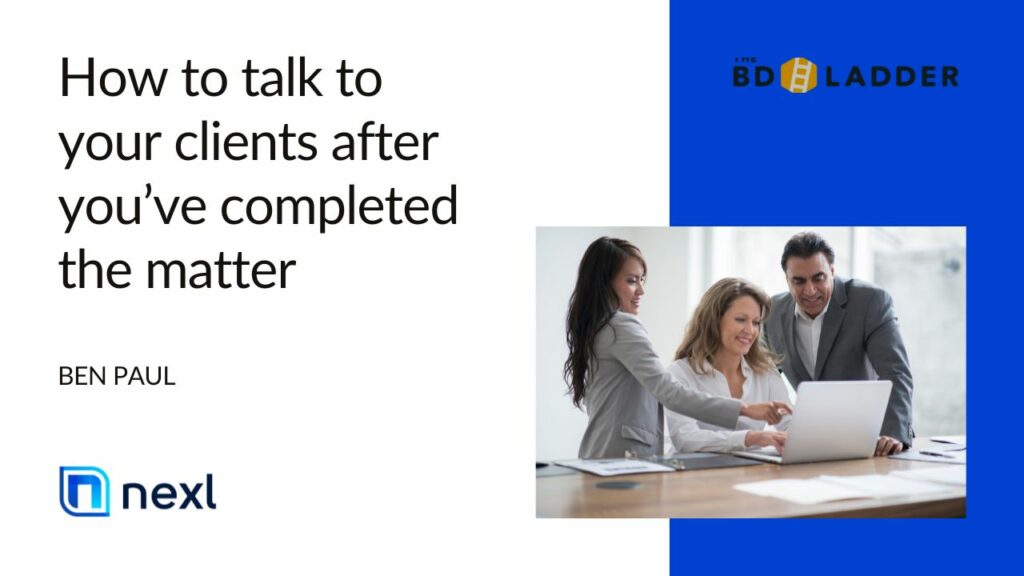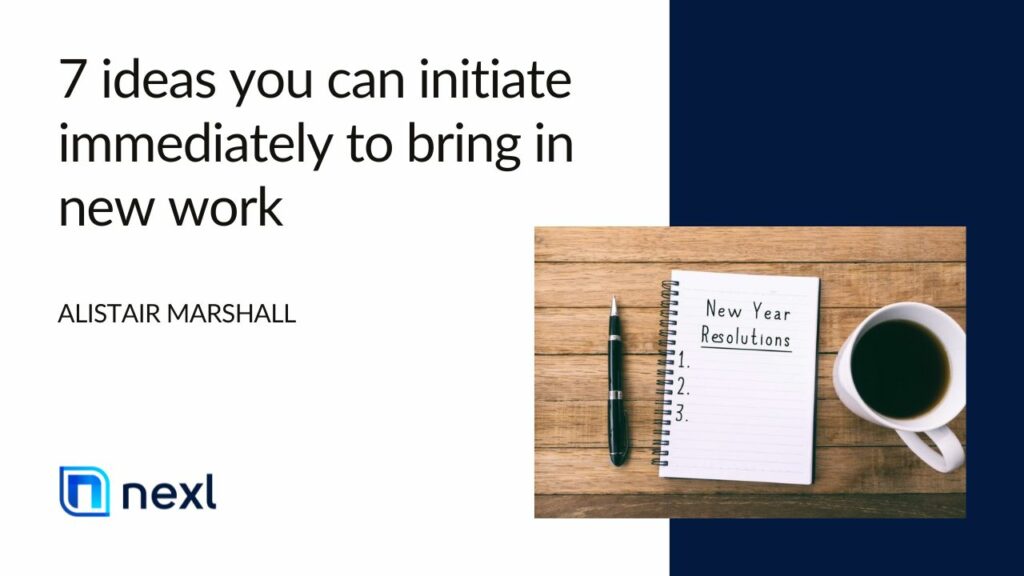ARTICLE BY BEN PAUL
For most lawyers, being instructed on and then completing a matter is the most enjoyable part of their job. That is, of course, no surprise. After all those years of studying law and then learning how to apply it, actually putting that into practice is the most rewarding part.
However, once that matter is completed, many lawyers struggle to then re-engage and meet with their clients. It is almost as if, even though for a period of time both parties – lawyer and client – worked closely together, once the matter was completed, they are now left with little in common. And yet repeat business from clients is one of the best and easiest ways to grow a practice.
So, before we tackle how to overcome the issue of talking with your clients post-matter, it is first important to understand what the barriers are for lawyers in engaging with their clients outside of the work they deliver for them. The reasons why you may be finding this tricky are:
1. The only value you give your client, is in the work you do for them.
It is of course critical that lawyers deliver their services to a high standard. And you can maintain a client relationship for many years along the lines of being reliable and delivering great work.
However, assuming you have competitors then you’re in danger of either a) being replaced if your service level slips, or b) getting driven down on price since they can buy the same legal expertise from your competitors.
In terms of long-term relationships and business planning, the main downside to this is that they only talk to you when they need your service. This means it can be hard to plan or resource for this work, as you may have little overview of when it will arrive.
2. You didn’t get proper client feedback.
It is vitally important that on completion of the matter you celebrate it internally, especially with your team who have put a great deal of hard work in. However, just because you got paid and hit all the required KPI’s or milestones, your client interaction shouldn’t finish with a remittance advice.
It is amazing how many people don’t know the business value that their client got from the matter they delivered. The reason they don’t know this is simple. They never asked.
In their formal or informal client feedbacks, assuming they have them, many firms and organisations will ask questions like the following:
“Were you happy with our service delivery?”
“Did you like our team?”
“Would you use us again?”
“Are you likely to recommend us?”
All great questions, however, they are missing one vital piece of feedback that will help you really understand more about your client’s business. In the future I suggest that you ask:
“How did the work we delivered impact on your business, and what you wanted to achieve?”
In short, did the client under achieve, achieve, or exceed their desired outcome? If you don’t ask this, not only will all your case studies be un-compelling or even boring, but more importantly your client might think you don’t really care about them and their wider business goal, or even how you fit in to help them achieve their goals.
Admittedly these questions do have to relate and be respectful to the type of legal service provided and client sensitivity needs to be taken into account.
3. You took no interest in their world outside of the matter.
You got on great during delivery, exchanged stories about your weekends, chatted about TV or sport, yet you don’t know what to talk about now the matter has finished. This is possibly because you never took an active interest in their role within their organisation, their personal drivers, or even what other things they were working on. It may be that your matter isn’t the most important thing to them, but do you know what is? All that time working together, and you may well be none the wiser.
All of this gives background about why you find it so difficult to engage your client outside of the work you do. However, the most important part of this is understanding what you need to do to change this cycle.
The 3 ways to talk to your clients after you’ve completed the work.
1. Take an interest in what’s important to them.
Not just in the matter, but also outside. What is important to their organisation and what are they are trying to achieve? What’s important to her or him in their role, be it now or in the future? I would recommend planning one or two questions you can ask in each meeting that will change the relationship, and will demonstrate you are interested in their wider world. Why not ask what their other priorities are?
2. Keep in touch in a meaningful way.
Once you know what’s important to them, keep an eye out for reports or third-party intelligence that you think they might find useful. Then, when you find it, email it to them with a short note, pointing out the things of interest to them. This info may well help them, but if nothing else, it simply shows you care about them. It is acts like these that start to build trust.
3. Close out your matter the right way.
Check in with them that the final outcome has met their organisational and personal needs. Find out in what ways it actually benefited them. Show a real interest in where they are going to next, and perhaps offer some insights or contacts to help them with their next stages, if appropriate. They’ll appreciate this.
If you help them succeed as their career grows, they’ll most likely take you with them, or even introduce you to the senior people in their organisation. Doing this properly means they are more likely to refer you to someone in their network. And referrals are one of the best ways of winning new work.
To summarize, if you have the courage to have a deeper conversation beyond the legal services you provide, you’ll not only understand your client better, you may also be able to ask them questions in every interaction that they may find valuable. This approach helps them with their own thinking. The key is to be curious and seek to help them. If you do this, you’ll have plenty of reasons to talk to them all year round and maintain that on-going relationship.
__________________________________________________________________________________
Ben Paul is the Director & Founder of The BD Ladder, a consultancy specialising in growing Legal firms. He has held senior BD and marketing roles in leading law firms and has over two decades experience in business development and marketing.






